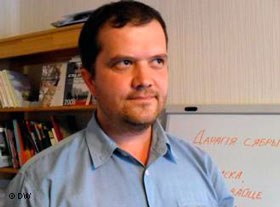Belarusian human rights activists in Kharkiv: writing appeals, working on hot-line, working as loaders
The Human Rights Humanitarian Mission in the Ukraine, launched by the Human Rights Center “Viasna”, started on June 4. During the five days of its work the volunteers, human rights defenders Zmitser Salauyou, Aliaksei Kolchyn and Marharyta Vialichkina helped to hundreds of refugees from Eastern Ukraine.
The mission is located at Kharkiv railway station, at the point of assistance to refugees. Beside Kharkiv, where there are more than 100,000 officially registered refugees, the human rights mission in the Ukraine intends to cover Chernihiv, Lviv, Cherkasy and Odesa.
A participant of the mission Aliaksei Kolchyn told RFE/RL that the hardest work the Belarusian human rights activists had to do was unloading the humanitarian aid from Czech.
Correspondent: What are you doing within the Human Rights Humanitarian Mission now?
A.K.: Today we are questioning the displaced on issues related to the receipt of aid at the social agencies of Kharkiv. The questioning is necessary for determining the problem points and simplifying the procedure for receiving the aid by refugees.
C.: Is your work at the point of assistance to refugees “Station Kharkiv” in demand?
A.K.: I think that it is very popular. There are also local volunteers, but free hands are always needed. Moreover, the locals also have to work and have their home duties, whereas we dedicate all our time to volunteer work. In general, we are doing all what the local volunteers as us to. For instance, several days ago we were answering calls on the hot-line and yesterday spent the whole day unloading a humanitarian cargo.
C.: What was there in that cargo? Who has sent it? And who will it be received by?
A.K.: This is humanitarian aid from the Czech Republic, where it was gathered by the local activists. The total weight of the cargo is 21 tons. Most of it will stay in Kharkiv, but a part will be directed to the towns located near the combat zone – Shchastya, Slovyansk, etc. The cargo mostly consists of household articles and clothing and diapers.
C.: There are more than 100,000 refugees in Kharkiv. Where are these people from?
A.K.: They are from the combat zone, from the Lugansk and Donetsk regions, the cities where hostilities were taking place and which were then left by the Ukrainian army.
C.: Do these people leave their cities temporarily or permanently?
A.K.: They are typical refugees. They leave and do not have much hope of return, because they know the real situation in their native places. They are totally unprepared for resettlement. In fact, they just take their children and go. There are cases when people return to the combat zone in order to have a look at their apartments. But it's impossible to live there, that's why they go to Kharkiv or some other city.
C.: Where are refugees placed in Kharkiv? Where do they live?
A.K.: Some of them have relatives, some have money to rent an accommodation. Those who have nothing are placed in so-called camps. These are social institutions which used to be vacant and now are used for placement of refugees. Of course, accommodation is the main problem, because it is expensive, and refugees usually have little money and few options to get a job.
C.: Can your work be done by anyone or does it require a certain human rights experience?
A.K.: There is nothing particularly difficult in it. Being human rights activists, we are better prepared for writing appeals and complaints, as we do such things in Belarus. And one doesn't need any knowledge to unload cargoes, just physical strength.
C.: How do you think, will Belarus ever need the experience of work with refugees?
A.K.: I very much hope that Belarus will not see the phenomenon of mass displacement and migration. However, such work is very important in that we must tell the Belarusian society about what is going on in the Ukraine.


















